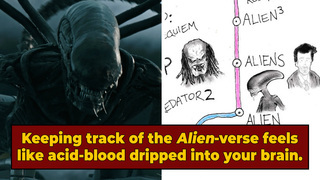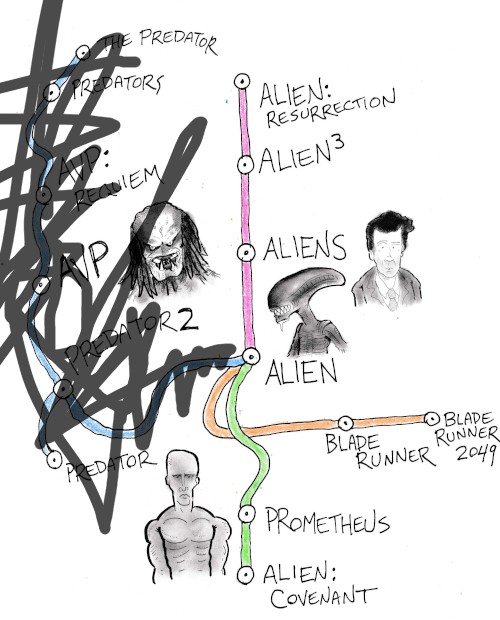Let's Try To Make Sense Of The 'Alien' Franchise's Continuity

It's hard to believe that a horror movie pitched as "Jaws in space" and greenlit by the studio purely due to the success of Star Wars ("it was the only spaceship script they had") has gone on to become one of our most pervasive pop-culture myths. Alien has spawned sequels, comic books, and even a doll line for those '70s kids looking to give Barbie and Ken their dream disembowelings.
More than 40 years later, it's hard to keep track of the various strains of continuity holding the Alien-verse together. So, as we like to do from time to time, let's try and map out the cinematic franchise that is Alien. Of course, it all begins with the 1979 original directed by Ridley Scott; a claustrophobic sci-fi nightmare featuring an extraterrestrial monster cobbled together with condoms and an actual human skull.

Not counting the unofficial Italian sequel that took place inside of a bowling alley, next came James Cameron's Aliens, which turned the whole thing into an edge-of-your-seat Vietnam War allegory -- and the real villain wasn't the Xenomorph, but sleazy 1980s Paul Reiser.

This was followed by the notoriously troubled Alien 3, which killed off Ripley (at the behest of Sigourney Weaver), not to mention Hicks and Newt -- throwing a monkey wrench into the comic series who were forced to rename the characters "Wilks" and "Billie." Then there was 1997's Alien: Resurrection, which brought back Ripley (not unlike Dolly the Sheep the previous year) through the magic of cloning. And for a while, it seemed like this might be it; the so-called "Alien Quadrilogy."

But in 1989, Dark Horse comics merged two of its in-house titles, pitting Alien's Xenomorph against The Predator from Predator. This crossover was made more-or-less canon when Predator 2 featured a Xenomorph skull in the Predator's trophy room/man cave.
Oddly enough, the studio's intention to make a full-blown Alien vs. Predator is what led to Ripley's death in Alien 3; Weaver asked to have her character bumped off after hearing rumors that Fox was taking the series in a decidedly goofier direction. This eventually came to pass with Alien vs. Predator in 2004 and Alien vs. Predator: Requiem in 2007. That also means that all of the Predator movies became part of the Alien-verse; from the original classic to the recent The Predator, a movie you probably forgot existed until this very moment.

A few years later, Ridley Scott returned to the franchise with the prequel Prometheus, which taught us all that the mysterious Space Jockeys from the original were really just giant pasty muscle men spreading magic black goo across the universe. Oh, and also one of these "Engineers" was Jesus, apparently. So wouldn't that technically make The New Testament part of the Alien franchise too? Prometheus was followed by the similarly Bible-y Alien: Covenant, which further explored the nature of creation myths, as well as the nature of Friday the 13th-esque sexy shower murders.
NSFW
Here's where things get bumpier than a joyride on LV-426; Prometheus contradicts much of the Alien vs. Predator movies. AvP takes place in 2004 and features a character named Charles Bishop Weyland, played by Lance Henriksen, who also portrayed Bishop in Aliens. This implies that whenever the Weyland Corporation cracked their lifelike android technology, some exec thought it would be cool to use their founder's likeness for their line of robot servants and, you have to imagine, sex-bots.
But in Prometheus, the Weyland Corporation founder is Peter Weyland, played by Guy Pierce in janky old man makeup. Plus, AvP takes place in 2004 and involves the discovery of an ancient pyramid housing Xenomorphs -- but in Prometheus, the Xenomorphs aren't created until the late 21st century. And it only happens because not-Tom Hardy gets zombified by the magic black goo and has sex with his girlfriend, who gives (spa)C(e)-section birth to a monster that later attacks the Engineer and bingo: Xenomorph. Couldn't be simpler.
Sure, maybe some wild theories could square this canonical circle, but the fact is Ridley Scott didn't give a shit about Alien vs. Predator. According to Prometheus screenwriter Damon Lindelof, when he pointed out that their film would contradict certain events from AvP Ridley, "just sort of looked at me like I had just slapped him in the face." This means that the entire Predator wing of the franchise was scrapped from the Alien series -- although, presumably, the Alien movies are still a part of the Predator franchise.
Easy to work around, right? Not so fast. See, a lot of people think that Blade Runner also takes place in the Alien universe. Which kind of makes sense; both feature dirty futures that rely on android labor and space travel. This isn't just some tinfoil hat theory; in a 1999 DVD of Alien, a special feature lists the Tyrell Corporation (the makers of Blade Runner's replicants) as a former employer of the Nostromo's Captain Dallas. And fans noticed that some of the replicants in Blade Runner 2049 bear a striking resemblance to the Engineers -- which perhaps imply that life on Earth was created by time-traveling robots built by Jared Leto, which isn't a road we're prepared to go down right now.
But most importantly, Ridley Scott claimed that he always envisioned the two movies as existing in the same fictional world, one where the characters from Alien could come back to Earth and "go into a bar off the street near where Deckard lives." You know, if they weren't all horribly murdered. The Terminator was also nearly incorporated into the Alien movies; James Cameron slipped a reference to Cyberdyne Systems in early drafts of Aliens, but thankfully for the sake of the legibility of this sketch, it was deleted. Although, as far as we know, it may still be part of the Predator-verse.

And the future of the series may just confuse things even further. District 9 director Neil Blomkamp's now-defunct sequel would have ignored the events of Alien 3 and beyond, bringing Newt and Hicks back to life. Original producer and Alien 3 co-writer Walter Hill wrote a treatment for Alien 5, featuring a new tagline: "In space, no one can hear you dream" -- prompting people to wonder if he might retool the franchise by making some of the less-beloved movies just a dream, presumably all in the mind of Jonesy the cat. Ridley Scott, too, is working on a new Alien movie. But once you've gone full erotic Magneto DeviantArt --
-- what more is left to say, really?
You (yes, you) should follow JM on Twitter! And check out the podcast Rewatchability
Top Image: 20th Century Studios